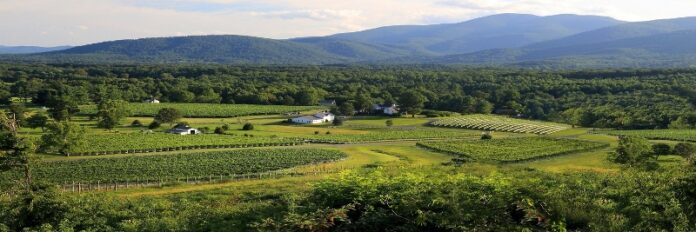 A newly released economic impact study shows that Virginia’s burgeoning wine industry contributes more than $1.37 billion annually to Virginia’s economy, an increase of 82 percent from the last economic impact study conducted in 2010. Almost all major economic drivers examined in the comprehensive study showed significant double digit growth.
A newly released economic impact study shows that Virginia’s burgeoning wine industry contributes more than $1.37 billion annually to Virginia’s economy, an increase of 82 percent from the last economic impact study conducted in 2010. Almost all major economic drivers examined in the comprehensive study showed significant double digit growth.
The 2015 Economic Impact Study of Wine and Wine Grapes on the Commonwealth of Virginia, which was completed by Frank, Rimmerman + Co., a nationally recognized accounting and consulting firm that specializes in the wine industry studies, was commissioned by the Virginia Wine Board (VWB) and completed in January 2017.
It is the first economic impact study of the Virginia wine industry since 2012. That report showed that the Virginia wine industry employed over 4,753 people and contributed more than $747 million to the Virginia economy on an annual basis. The study reflected the impact of approximately 193 wineries in 2010.
From 2010 and 2015, the number of wineries increased 35 percent, from 193 to 261. The number of full-time equivalent jobs at wineries and vineyards saw a 73 percent increase, from 4,753 to 8,218. Wages from jobs at wineries and vineyards increased 87 percent during the same time period as well, from $156 million, to $291 million.
Tourism to Virginia wineries also showed impressive growth. The number of people visiting wineries grew by 39 percent, from 1.6 million visitors in 2010 to 2.25 million visitors in 2015. At the same time, wine-related tourism expenditures grew dramatically from $131 million to $188 million, a significant 43 percent increase. The study attributes the growth of tourism to these factors: the increase in the number of wineries and the growing quality of the wines.
“The Virginia wine industry continues to be one of the fastest growing segments of Virginia’s diverse agricultural industry,” said Dr. Basil I. Gooden, Secretary of Agriculture and Forestry. “We are especially proud of the health and growth our wine industry. Unlike many industries, once vineyards and wineries are established, they are effectively rooted and tied to their communities – a Virginia vineyard cannot simply be relocated to another region or outsourced to another country. Virginia wine and grapes are inextricably tied to the soil from which they are grown. Many of these wineries are providing important jobs in the rural areas of our state.”
The report showed significant growth during the five-year period by examining the number of grape bearing acreage, as well as taxes generated for state and local governments. The only major area to show a decrease was the number of growers. This reflects a healthy consolidation of grape acreage under fewer growers. More grape acreage under fewer growers will help reduce the over cost of growing the grapes and provide for strong economic viability for the industry.
Sales of Virginia wine reached a record high in fiscal year 2016 with more than 556,700 cases, or more than 6.6 million bottles, sold. This volume marks a sales increase of more than 6 percent over the previous fiscal year.
For more information about Virginia’s wine industry, please visit the Virginia Wine Marketing Office’s website here or call (804) 344-8200.

